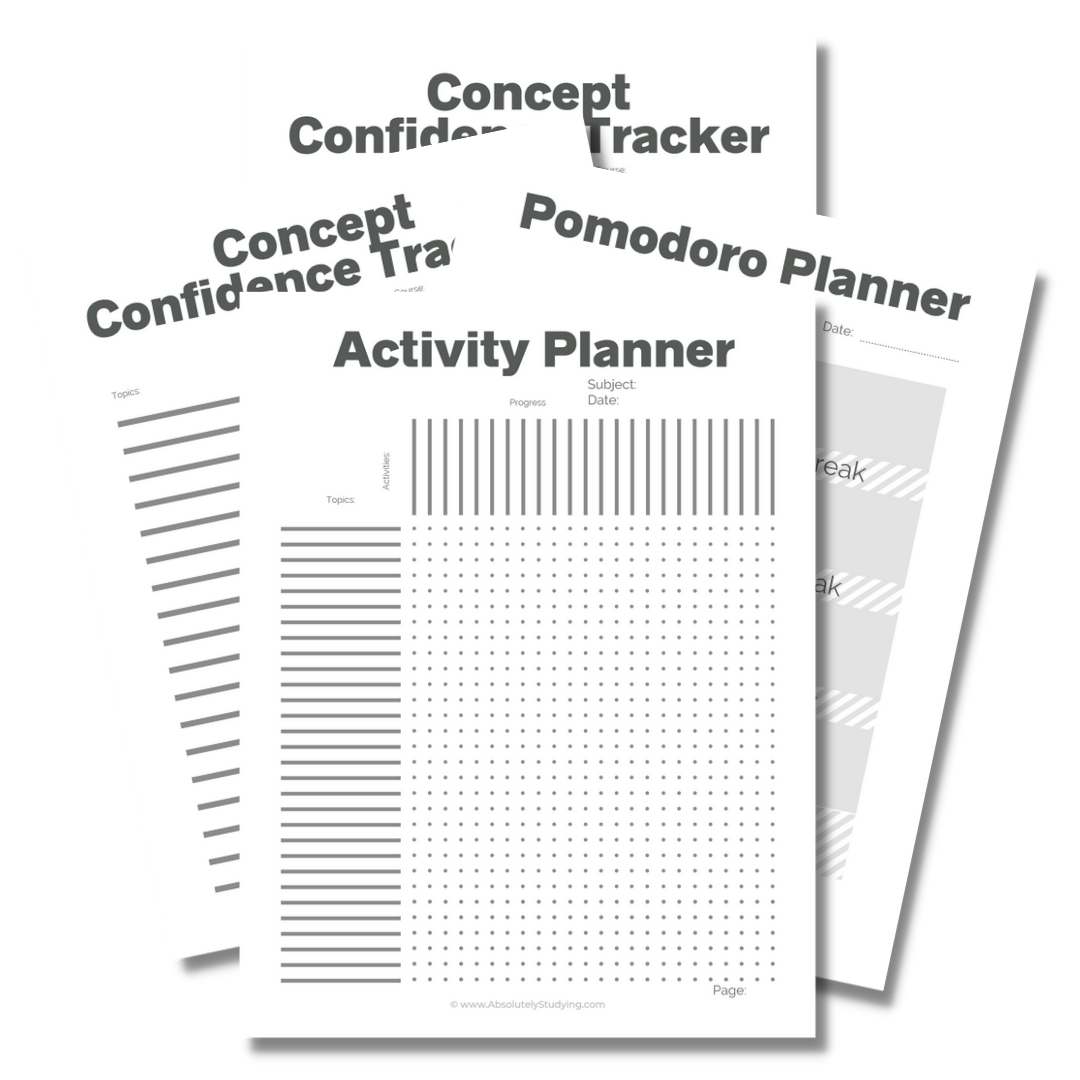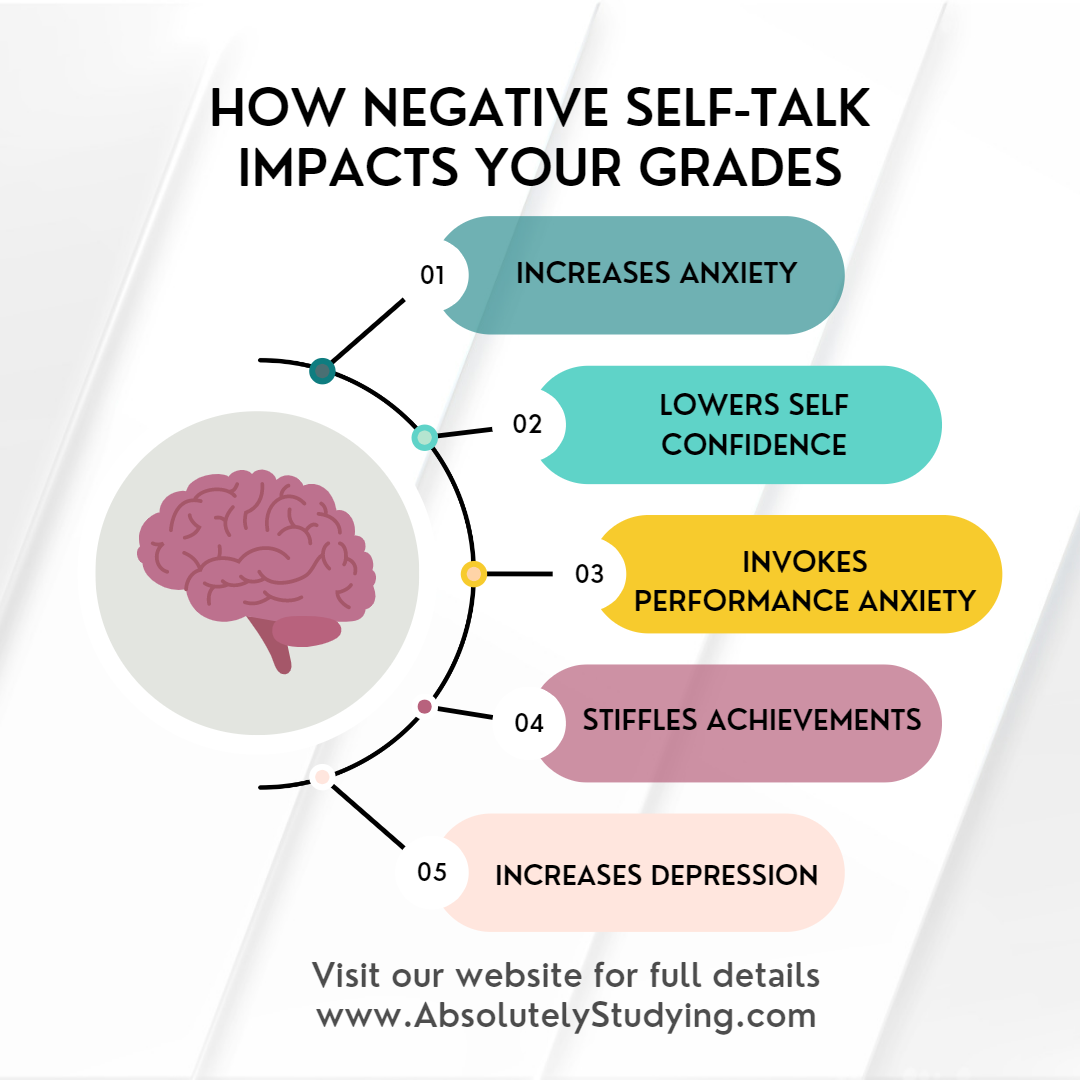The Hidden Impact of Negative Self-Talk on Your Academic Success
The Hidden Impact of Negative Self-Talk on Your Academic Success
How Negative Self-Talk Affects your Grades.
Everything you need for the semester you want!
This bundle includes:
The Syllabus Study Planner
The Pomodoro Planner
A Confidence Tracker
A Q&A planner
The “Get Organized Checklist”
and more!
This workbook is full of super useful resources that can be applied to every aspect of your day.
* Disclaimer * Some of the posted links are affiliate programs. By clicking these links, I may receive monetary compensation. This will not alter the price or change the buyer's experience.
Navigating the stresses and demands of achieving your dreams in a post-secondary setting can cause immense physical, mental, and emotional strain on you. It’s no wonder that so many people underachieve or just give up. This goes double for students who are eyeing a prestigious program.
But you are not going to be that person. You are going to shine bright and make it through! I’ve got your back, and I will make sure of it.
But what about when the pressure does get to you? Everyone has those moments. Off days when you just cannot get out of that funk. When it’s much easier to lay in bed and eat a tub of Ben and Jerry’s rather than do all of the adulting.
We often discuss study and organizational tips for your time or physical items. Today, we are going to go a bit off-road and talk about organizing your thoughts. Can we do this? Or is the way you think set in stone?
Download Now: FREE Study Planner & Activity Tracker
Download your free study planner and activity tracker.
Everything you need for the semester you want!
There is an increasing openness around the discussion of mental health. This new honesty shines a light on many problems associated with the dark place students often seem to be falling into. Normalizing it helps to face these problems head-on and possibly prevent some.
There appears to be a direct correlation between the moods that students experience and the types of self-talk they engage in. When you are feeling down, it can spread to all areas of your day. It could seem that nothing is going right. This pessimism spreads and grows, invading everything you touch. These dark funks and depressions are not the only culprit contributing to negative thought patterns. Exam and test anxiety are also substantial contributing factors to the hopelessness and pressure felt by students young and old.
Students who experience test anxiety have a lasting and consistent tendency to experience functional reactions, both physically and behaviorally, during assessments and exams.
This just means that their stress manifests through bodily movements or actions that may not otherwise be characteristic of the person exhibiting them. These could be as minor as sweating or biting their nails or as significant as a full-on panic attack.
These fears arise surrounding the possibility of poor outcomes or failure. This nervousness is a direct result of the specific way that these students react to the evaluation. The response often results in the emergence of test anxiety.
Exams are not the only culprits that can summon text anxiety. Setting unrealistic goals and perfectionism can also contribute to this.
What is Negative Self-Talk
Sometimes, that little voice in the back of your head can make all the difference in picking yourself up or driving you deeper into depression. We often hear reports of athletes talking to themselves. They might give themselves little pep talks in the moments before a race or during a big game. These words will clear their thoughts or help them focus. Maybe they will even give themselves a boost of positive energy. We also hear how it gives them that extra bit of motivation to help them break away from the competition.
This practice is actually supported by scientific research. The studies show that uplifting self-talk can improve the success and presentation of abilities while boosting concentration and elevating self-confidence. These benefits translate into a measurable increase in performance.
When the self-talk is hostile or degrading, performance is adversely affected. Anxious self-talk falls into this damaging category.
These thoughts will fill your actions with unease, caution and self-doubt. If these ideas creep in when you are required to work at your best, the results will suffer. Your performance will reflect this apprehension compared to how you would do when you are confident.
Examples of Positive Self-Talk
The differences between positive and negative self-talk are pretty distinct. Statements that fall under the positive self-talk umbrella are generally constructive or motivational.
You say these statements to yourself to sharpen your focus or boost your confidence. Distracting thoughts or language used to console yourself during moments of doubt or despair are also considered positive self-talk. These are all effective coping strategies that will boost, not hinder, your performance at the time of evaluation.
Examples of Negative Self-Talk
Is that little voice in the back of your head ever not so kind? Have you ever said or thought things about yourself that are more malicious than constructive? When these thoughts become a regular occurrence, creeping into your daily events, you have adopted the habit of negative self-talk. You can not let this fester.
How Negative Self Talk Affects Us
Let's focus on how this cycle started and why it still persists today so that we can shatter this tendency to get you the marks you deserve.
Negative self-talk is a learned behaviour. Infants are not born with the inherent ability to doubt themselves. You were born fearless, and even into childhood, you believed that you could do pretty much anything. Unfortunately, life, circumstance, and the people around you have taught you that this is not so.
Before long, children learn to doubt themselves and their abilities. You see others excel and think that you could never reach that level. You hear other people saying that they can not do something, and then start repeating this to yourself.
The internalization of self-doubt and apprehension is the beginning of negative self-talk. Repeating these thoughts and phrases throughout the years breeds the anxiety that many of us experience in our studies.
Identifying negative internal dialogue patterns is a fantastic first step in controlling and modifying your emotions. This can be helpful whether you suffer from depression and anxiety or if you just fall into the occasional slump.
Noticing these triggers and how they make you feel can help you combat them and change the outcome.
If you feel like this is hopeless, it is not just you. This feeling of despair can be a symptom of your negative self-talk or anxiety. Students with higher levels of test anxiety are much harder on themselves than those who do not have this problem. They often assume that the goals they wish to reach are too high and expect to fall short.
When asked, these students will often predict that they will obtain much lower grades than those without the same conditions. This view of their abilities persists regardless of preparation time, class standing, or subject knowledge. So, you can be at the very top of your class. But, you will not believe it, regardless of how much studying you have put in because of this negative internal dialogue.
These same undergraduates will even evaluate themselves more severely, giving less credit to the work they put into preparing for the exam. They also mark their effort more critically, believing their work is of lower quality than it actually is.
There is an interesting phenomenon with the practice of allowing this negative self-talk to embezzle your consciousness. Even if you don’t believe what you’re saying in this self speak, these words and phrases can still significantly impact your performance. Luckily, people are also not required to actually believe in their positive self-talk to show superior performance.
So, what does this mean? Negative self-talk will still diminish performance, whether you believe what you say or not.
To put this simply, self-talk has consequences. Telling yourself that you can excel at something will increase your performance. Even if you do not actually believe it at first, constantly criticizing and second-guessing yourself will eventually wear away at even the most highly confident people, allowing self-doubt to creep in and ultimately diminish the outcomes.
Individuals who engage in negative self-talk can expect to experience underachievement compared to those who engage in positive self-talk. But this difference is not black and white. Low self-esteem and perfectionism may also negatively affect self-perception and self-evaluation.
So, why does this happen? It has been suggested that mental resources become tied up in anxious thoughts, making them unavailable during the exam, ultimately changing your performance. Severe test anxiety can impair working memory, significantly diminishing execution.
Study Skills Digital Course
Learn how to create a stress-free comprehensive strategy!
As the level of test anxiety experienced goes up, academic achievement goes down. When high test anxiety is experienced, evaluating and perceiving yourself or your abilities can also be substantially impacted negatively. Students with high test anxiety expect to underperform on their exams compared to students who experience low test anxiety. Then, they evaluate themselves as inferior.
These lowered expectations then creep in and take over your life. Test anxiety can also affect motivation, causing neglect in studying, homework, and other learning exercises. This, unfortunately, drives you deeper into depression, causing the loss of even more motivation.
Procrastination will take hold, and then you begin to fall behind. This creates a spiral that leads to avoidance. Performance is further diminished by hindering exam preparation, consuming brain space during homework, or both.
Negative self-talk and its implications are usually not restricted to your studies. If you are a person who engages in this behaviour, you will likely experience it in other aspects of your life.
How to Stop Negative Self-Talk and its Impact on Your Grades
To truly get out of this loop, you will have to address and resist this temptation, regardless of the situation. Do not let it interfere with how you perceive your finances or relationships. Approach conflict resolution in both areas from a positive stance. Allowing this feeling of helplessness in any aspect of your life will invite it into all aspects of your life.
The lower your opinion of yourself, the harsher and more critical you will be at evaluating your performance. This just causes this cycle to spiral out of control further. Social considerations, biological and psychological factors all play a role in the levels of test anxiety experienced.
As you might expect, this is reported more often in female students than in males. Female students experience higher anxiety than males in:
calculations,
public speaking,
open-ended questions,
long answer questions,
short-answer questions
We tend to leave more questions unanswered during test time, likely because of our heightened stress level.
The stark contrast between reports of anxiety in females and males may be due to several factors. It could be due to increased pressure on females to succeed academically. These pressures often manifest due to social roles and expectations. This, in turn, increases the strain females put upon themselves and causes this increase in the anxiety they feel when confronted with the possibility of failure.
Another possible explanation may be that due to social roles. Men are more reluctant to report experiencing anxiety as it may be perceived as a threat to their masculinity. This can cause men to under-report their fears, skewing the results.
The effects of negative self-talk can be extremely long-lasting. Once locked in this negative pattern, it can persist far beyond the educational setting and into adulthood and career life.
Many adults show crippling fear in the face of external evaluation, self-evaluation, and their likelihood of achieving their goals and ambitions. This persisting hopelessness can manifest even more pronounced in women. We tend to exhibit significantly higher levels of humility when believing in our ability and pursuing professional ambitions. This is likely due to the same social pressures that cause us to exert additional strain on our academic performance in the first place.
How to Change Negative Self-Talk
As you can clearly see, negative self-talk is like a parasite that attaches to aspirations and slowly drains from them until all that is left is self-doubt. The effects of negative self-talk are not helpful. They can be a massive contributor to underachievement, hopelessness, and falling short of your dreams.
The most unfortunate part is that you are standing in your own way. There are ways to stop sabotaging yourself, but first, you need to understand how you are doing it. To figure that out, we need to analyze what you are saying during your self-talk.
Identifying what you say to yourself can give you insight into why you say it.
Once you have learned to engage in negative self-talk, the habit becomes increasingly easy to repeat. Soon, it will become an unconscious reflex in stressful situations. Tense settings will only push you deeper into strain, causing anxious thoughts, which will create more negative self-talk.
This vicious cycle can quickly spiral downwards when left unchecked. These ultimately allow negative feelings to accumulate. Breaking this cycle can help improve this air of hopelessness.
You can break this cycle when you can identify and correct negative self-talk.
You need to actively engage in the reconstruction of positive self-dialogue. This will lead to higher emotional well-being. You must reprogram your brain to use positive self-talk as your default coping mechanism.
Reframing your thoughts in a positive light will help boost achievement and motivation. Over time, it will also reduce test anxiety.
If you are a regular engager of negative self-talk, there are things you can do.
Recognize when you start to say negative things to yourself and stop immediately. Do not allow yourself to go down the rabbit hole. The second you realize you are saying unkind things to yourself, stop. You would not allow yourself to be subjected to people who continuously berate you. You would walk away. Don't be your own abuser.
Question the thoughts directly as they appear, then critically seek out honest answers. Is what you are saying to yourself really accurate? I doubt it very much. Often, we will exaggerate the mediocrity of our performance, even in sarcasm or in jest. Remember, self-talk has consequences. What you say jokingly, if repeated enough times, will cause self-doubt and diminish your performance. Do not let these comments be the invitation for a pessimistic self-dialogue. Think critically about what you are saying about your accomplishments. You are probably doing much better than you give yourself credit for.
Replace negative self-talk with positive statements. When you do need to reflect on your performance, be kind. Give yourself constructive criticism. Frame your self-talk in a way that will build your confidence, not break it down. Even if you do not believe the words, practicing engaging in this optimistic narration will eventually cause it to be true. This is called reframing, and it can be a potent tool. It can broaden your perspective of the situation. To do this, you must become aware and honest about the position you have found yourself in. Next, you must evaluate the content and, finally, challenge the negative thoughts that come creeping into your mind by questioning their validity and answering honestly.
Merely changing the tone of your self-talk from negative to positive has been proven to improve functioning. Framing how you critique your performance in a positive light actually breeds more positive self-talk. This, in turn, will enhance execution leading to even more positive support. You can quickly move into a cycle of positive reinforcement, ultimately boosting your self-confidence and reducing anxiety.
You can teach yourself how to engage in positive self-talk.
Just as there are several types of negative self-talk, with varying effects on mood and performance, there are also several different types of positive self-talk. Self-talk to enhance focus is the most common, followed by instructional, calming, and motivational methods. None of these types show any more benefit than the others; they are all situational.
Instead of kicking yourself over failing that exam, try to seriously consider your study efforts leading up to the exam. Did you really study as efficiently or as thoroughly as you should have? Were you already behind in the course or unsure of the content before you started to prepare? How you think about and approach these problems is just as important as what you do to rectify them:
Start by making a plan on how you can better prepare for the rest of your exams.
Devise a strategy on how you can make up for these missed marks to still pass the course.
Plan how you will approach future classes so as not to have this reduced mark impact your GPA.
Determine if you will have to take more courses to make up for this one.
How to Avoid Negative Self-Talk and Level the Academic Playing Field
During studies, most students explained that much of their anxiety was caused by not having enough information about what would be covered on the exam. Asking questions about the exam, structure, and contents could help you defeat some of these fears.
Use the classes before the exam to ask the professor these questions. Try to flush out as many details as possible of what material will make it up and what it would look like. Having these questions answered can quell some of these fears.
Because anxiety can hurt test performance, it would be helpful to add diversity to the makeup of the final mark. This could be done by including a variety of assessments rather than a single final exam. This would make the final exam worth a much smaller portion of your mark and add different types of other assignments to balance it out.
This would mean that students who experience crippling exam fears could make up lost marks in various exercises that they might be better at. Unfortunately, it could also increase the workload for each of your courses. This is an intriguing balancing act.
Until universities and colleges get on board with this, what can we do?
Keep it positive! Consistency and diversity of the content of the positive self-talk can boost performance. Give yourself praise regularly, and this habit will become easier.
It is also true that moderate levels of anxiety help to motivate. A small amount of test anxiety may be healthy and boost a student's exam performance. Still, persisting self-doubt will crush performance and motivation, massively crippling your chances of succeeding.
Manifest the Life You Want!
The How to Manifest Good Grades Workbook isn’t just a workbook; it’s a trusted friend who’s guided me (and many others) through the ups and downs of academic life. I’ve crafted a practical 7-step journey that has changed how I approach schoolwork and achieve my goals.
You know those times when everything feels like a blur, and you can’t catch a break? This workbook was born from those moments, designed to help you find clarity and create a path forward. Each page is like a gentle reminder that you’ve got this - and I’m right there with you, cheering you on.
It’s not about rigid rules or impossible standards but about creating a plan that fits your unique journey. Whether you’re new to manifesting or just curious, this workbook makes it easy to dive in and discover how powerful this practice can be.
I want to share this with you all because I know how hard it can be to navigate school, life, and everything in between. If you decide to give it a try, I’d love to hear how it’s helping you. You deserve to reach your goals, and I hope this workbook can be a small part of that journey.
Be kind to yourself, say pleasant things, and regularly engage in positive self-talk. If you can't think of anything nice to say to yourself, repeat positive affirmations. This practice will allow positivity to enter your thoughts and breed genuine positive inner dialogue.
If you suffer from test anxiety, pick up my free study tracker. It has more than 20 different study activities that you can track over the semester. Effortlessly plan and track each study session leading up to your exam so that you can be as prepared and confident as possible.
I would like to be transparent so that there are no misunderstandings. As an affiliate, I may earn a small commission from any products linked in this post. This is not a sponsored post, and I was not asked to recommend these products. These are products that I genuinely love and want to share with my audience.

















